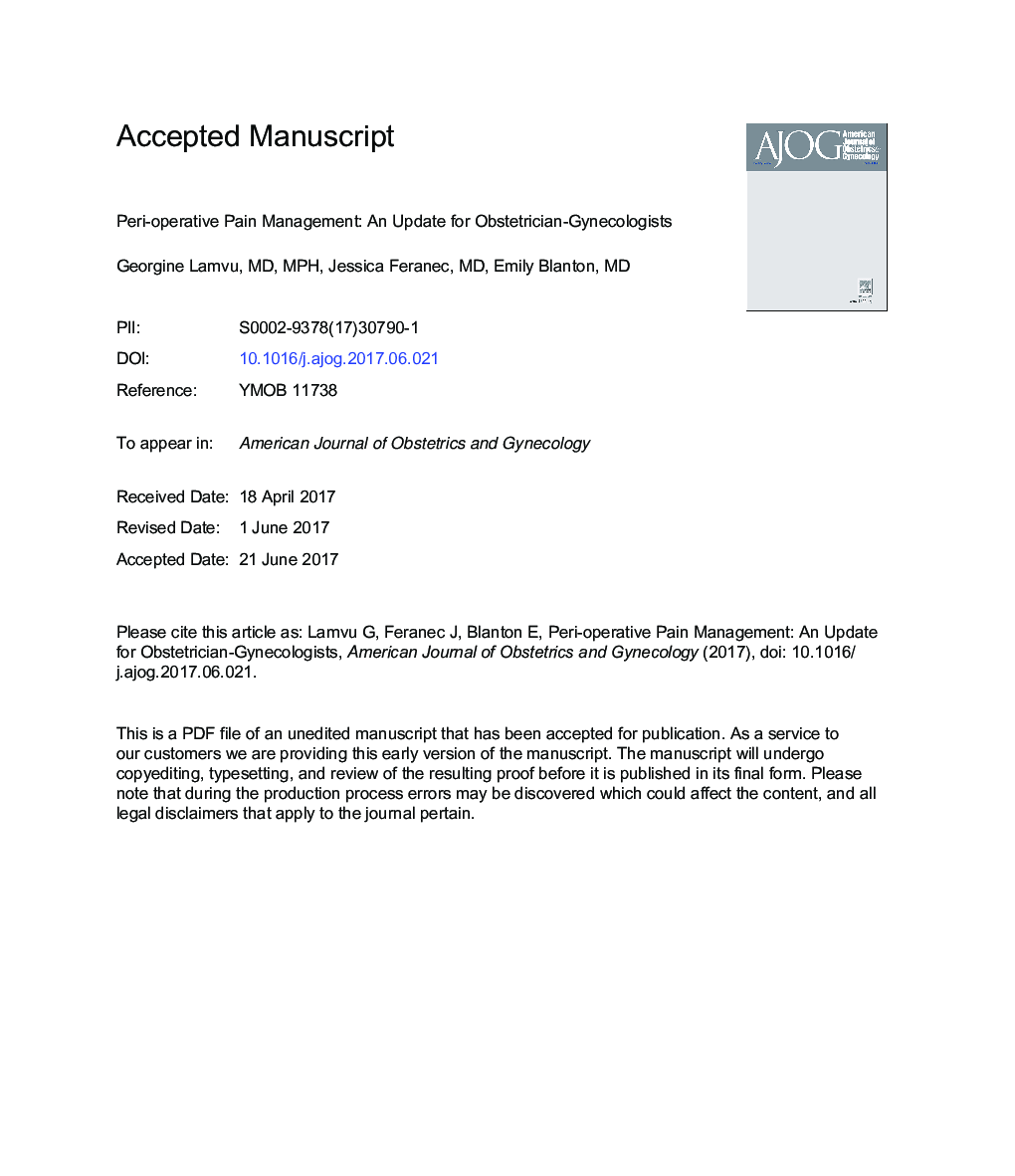| کد مقاله | کد نشریه | سال انتشار | مقاله انگلیسی | نسخه تمام متن |
|---|---|---|---|---|
| 8752603 | 1594864 | 2018 | 31 صفحه PDF | دانلود رایگان |
عنوان انگلیسی مقاله ISI
Perioperative pain management: an update for obstetrician-gynecologists
ترجمه فارسی عنوان
مدیریت درد درازمدت: به روز رسانی برای متخصص زنان و زایمان
دانلود مقاله + سفارش ترجمه
دانلود مقاله ISI انگلیسی
رایگان برای ایرانیان
کلمات کلیدی
ترجمه چکیده
اپیدمی مبارزه با مواد مخدر در ایالات متحده بی سابقه است و همچنان بدتر شده است. بسیاری از مبتلایان به مواد مخدر قرص های خود را از طریق نسخه های قانونی، به طور مستقیم یا غیر مستقیم از یک ارائه دهنده پزشکی دریافت می کنند. در حالیکه پزشکان مسوولیت درمان درد را دارند، اکنون مشخص شده است که تجویز تجویز داروهای مخدر به یک بیماری همه گیر آلوده شده است. جامعه پزشکی باید عواقب ناخواسته سوء استفاده از مواد مخدر و سوء استفاده را با نیاز به کنترل کنترل درد کنترل کند. علاوه بر این، ارائه دهندگان توسط سیستم حقوقی و سازمان های حرفه ای برای اقدامات تجویزی پاسخگو هستند. استفاده مسئولانه از مواد مخدر مهم است و کنترل درد، ایمنی را جایگزین نمی کند. مدیریت موثر و مطمئن درد نیاز به ارائه دهندگان ارزیابی خطر، درک خطرات دارو، اجتناب از وابستگی بیش از حد به مواد مخدر، و به اندازه کافی نظارت و آموزش بیماران است. متخصص زنان و زایمان به طور منحصر به فرد برای اعمال شیوه های کنترل درد به عنوان ارائه دهندگان مراقبت های اولیه و جراحان که به طور منظم هر دو شرایط حاد و مزمن درد را کنترل می کنند، قرار دارند. بنابراین، هدف این نشریه این بود که متخصصان مامایی و متخصصین زنان را با مفاهیم معاصر در مدیریت درد آشنا سازیم و دستورالعمل های اخیر را به شیوهای که برای تخصص ما مناسب است، خلاصه کنیم. ما در کنترل درد درازمدت تمرکز می کنیم که دوره زمانی بلافاصله قبل، در طول و بعد از جراحی است. موضوعات مورد بررسی عبارتند از: ارزیابی خطر مناسب برای ارزیابی پتانسیل بیمار برای کنترل ضعف درد یا توسعه درد مزمن یا سوء استفاده از مواد مخدر؛ مدیریت درد چند متغیره با جایگزین های غیر دارویی و غیراپوئیدی، استراتژی های استفاده ایمنی امن؛ آموزش و مستند سازی؛ و ملاحظات خاص برای زنان، جانبازان، و نگرانی های شیردهی.
موضوعات مرتبط
علوم پزشکی و سلامت
پزشکی و دندانپزشکی
پزشکی و دندانپزشکی (عمومی)
چکیده انگلیسی
The opioid epidemic in the United States is unprecedented and continues to worsen. Many opioid abusers obtain their pills through legitimate prescriptions, directly or indirectly, from a medical provider. While practitioners have a responsibility to treat pain, it is now becoming clear that aggressive opioid prescription practices contribute to an epidemic of abuse. The medical community has to balance the unintended consequences of opioid misuse and abuse with the need to provide adequate pain control. Additionally, providers are being held accountable by the legal system and professional organizations for their prescribing practices. Responsible use of opioids is paramount and pain control does not supersede safety. Effective and safe pain management requires that providers perform risk assessments, understand medication risks, avoid excessive reliance on opioids, and adequately monitor and educate patients. Obstetricians and gynecologists are uniquely positioned to influence pain management practices as primary care providers and surgeons who regularly manage both acute and chronic pain conditions. Therefore, the objective of this publication was to familiarize obstetricians and gynecologists with contemporary concepts in pain management and summarize recent guidelines in a manner that is applicable to our specialty. We focus on perioperative pain management, which is the time period immediately before, during, and after surgery. Topics reviewed include proper risk assessment to evaluate a patient's potential for poor pain control or development of chronic pain or misuse of opioids; multimodal pain management with nonpharmacological, nonopioid alternatives, safe opioid-use strategies; education and documentation; and special considerations for women, veterans, and lactation concerns.
ناشر
Database: Elsevier - ScienceDirect (ساینس دایرکت)
Journal: American Journal of Obstetrics and Gynecology - Volume 218, Issue 2, February 2018, Pages 193-199
Journal: American Journal of Obstetrics and Gynecology - Volume 218, Issue 2, February 2018, Pages 193-199
نویسندگان
Georgine MD, MPH, Jessica MD, Emily MD,
